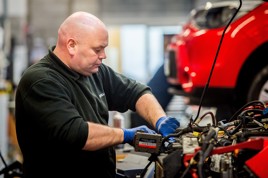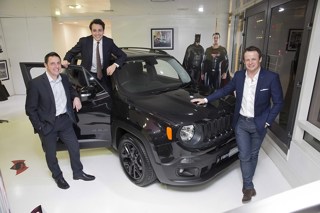AM interviews Bill Fennell, head of The Motor Ombudsman, who discusses the heighted regulatory scrutiny, the watchdog's plan to introduce artificial intelligence to manage an ever-increasing case load and the ombudsman's role in the adoption of EV technology.
Bill, can you tell us what trends you’ve seen emerging over the last year?
The main issue we continually see is about how customers are treated when they go into garages and dealerships. That said, the biggest thing for us is actually the volume of the cases. We’ve seen something in the region of contacts going up by around 39% during the course of the last 12 months.
And it’s the number of contacts we're getting now from consumers that are using smaller service and repair outlets which we cannot help which is of concern – as they’re not TMO members. In fact, we're now getting probably as many contacts that we cannot help as we can. That's a big story because, while we accepted 8,900 cases last year, we had another circa 8,500 cases that we could not accept, because on the whole, the garage wasn’t part of TMO.
The businesses that join TMO do so voluntarily because they think it's the right thing to do. The cost of joining is £350 so it's not going to bankrupt a business. I don't think it is the cost though. I think it's because membership of the TMO is not mandatory.
Do you have any opinion on the FCA investigation into discretionary commission on car finance before 2021?
I think the FCA has done the right thing. I think they've been speaking to the Finance & Leasing Association. They seem to have got everything in a row in terms of what they are doing.
Dealers and manufacturers were probably getting frustrated with the number of legal firms contacting them with class actions so putting a lock on it for nine months to go and find out more about what is the right thing to do is a good step. It does seem much more coordinated and thought-through than what happened with PPI.
Consumer Duty, discretionary commission and now GAP insurance. We've got three issues coming down the road. Is that creating nervousness in companies involved in finance and insurance services?
As regards GAP, the FCA didn't say they were going to ban it. I suspect the claims rate is very low. I mean, how many people actually write off their cars and then go on to claim?
But if you are one of those unfortunate drivers that does write off their car, and you have GAP, my goodness, I bet you're glad that you've got it because it will pay out. But yes, there's got to be a level of nervousness.
With Consumer Duty, there are grey areas but I think that whether it’s the finance houses, the manufacturers or dealerships, they’ve tried to cover those grey areas. Everyone on the whole has taken it very seriously and are trying to align themselves with where they think the FCA is.
Everybody loves certainty soI suspect everyone has put a lot of resources against this. The question really is, is the FCA looking for a big scalp? Obviously, there was Lookers which sent a lot of waves through the sector, probably for the right reasons as well.
Turning to technology issues, do you see issues emerging in the maintenance of an EV compared to a diesel or petrol alternative?
What we're seeing quarter on quarter is that the volume of EV cases is going up. It's still really small. But you'd kind of expect it to be going up in line with the number of cars available.
 Consumer complaints again are around mainly customer service but give it another couple of years and my expectation is that because EVs cars are simpler to maintain we should see the number of complaints coming down.
Consumer complaints again are around mainly customer service but give it another couple of years and my expectation is that because EVs cars are simpler to maintain we should see the number of complaints coming down.
That will happen once we get a substantial volume in the marketplace but what we're seeing is mainly complaints over consumer misconceptions. They still don't understand about range and how the battery will be affected during colder weather but most of it is around how it was sold: ‘was I told everything?’ or ‘it didn't meet my expectations from what they told me’.
The big one really for us is probably tyre wear but also brake usage with people changing their driving style. EV drivers don’t use the brakes anywhere near the same as in an ICE vehicle and that can lead to the brakes sticking when they're not being used constantly.
Do you think the technology may be tweaked to reflect real life usage?
That's probably more of a safety piece with the manufacturers who may develop different ways to manage the brake systems to make sure that they didn't lock through lack of use. I guess all those things will come as long as we stick with electric.
Are there ongoing issues with manufacturing that you're working on actively?
Not at the moment. Over the years we’ve looked at all the case data and we've gone back to manufacturers to look at higher tyre wear and crabbing features. We've had one or two of those over the years but at the moment, there's nothing major that we've seen from the manufacturers or from the data side.
As we move forward, our focus now is on the new entrants. Last year MG joined us. Omoda has just joined together with the new smart.
Part of our remit as an ombudsman is trying to get as broad reach as we can so we try and cover as many consumers and today it's about 98% of new cars sold.
Will the emergence of the agency model have an impact on TMO’s work?
We did a review year and a half ago but what we see is a lot of the manufacturers now seem to be pushing back on the agency model in terms of the date they're going to introduce it. Some of them are even saying they're not going to introduce it.
All it would mean is that we would just need to make sure our codes are relevant for the manufacturer if they ended up being the party that was actually responsible for selling the vehicle. We didn't actually see it being a real issue for the consumer or for us in terms of the service that we can offer to the consumer or business.
Is the industry moving fast enough to get the new skills that the EV fleet requires?
The industry has always had an issue with the perception of apprenticeships and in terms of training for EVs and the new technologies, the sector was slow in take-up. I think it's improving. I think it has sped up now. I think there's more cars coming in although the smaller, independent privately owned businesses, they're still on the cusp about investing in the equipment needed to service them.
 The industry needs to find a way of making automotive careers more attractive. I don't have the answer to that. But I think it's probably got to be salary-driven. I also think it's around the perception of what a technician actually does and the skills you need and then making sure that that the pay meets expectations. For me, it’s about starting at grassroots levels, getting into the schools.
The industry needs to find a way of making automotive careers more attractive. I don't have the answer to that. But I think it's probably got to be salary-driven. I also think it's around the perception of what a technician actually does and the skills you need and then making sure that that the pay meets expectations. For me, it’s about starting at grassroots levels, getting into the schools.
What plans do you have for 2024?
We're hoping that cases will not grow at the same rate as 2023. Internally, it will be about development of the team. We have a really good team. It grows every year in line with the cases that we have. But it's then actually developing those individuals and trying to give them a career path through TMO. We're now in a position where we've done all the basics over the years and now we're in a position where we want to get more into leadership and management training.
The more cases we get, the more revenue we receive but then again, it goes into more heads -something in the region of probably 95-96% of our revenue goes in soft costs.
So one of the big things that we're looking forward to is examining whether to use AI at the front end of the business.
Around 56% of consumers will submit their case via the TMO website and we’re looking at whether AI can ensure that all the documentation supporting that case is there. Over the lifetime of cases, consumers could be sending us 100 - 200-page documents, and we have to read them all because otherwise we can miss something.
The ultimate decisions will always be made by an individual so it's more about AI sifting through information. I think that could be quite exciting and we’re looking at a number of legal firms that are already doing this while keeping data safe.
Every time we get a case increase, we have to recruit staff. That takes a couple of months. You've then got to train them into how we work and the disciplines that we use in our system. That can be another two months so you find that it can be four months before they really start being productive. And that's a third of the year gone.
So we need to be able to find a way that we make the best use of the skills and apply them more in actual decision-making. I'd like that to start in Q2.
How do you see the EV retail environment evolving?
There is definitely a move by manufacturers to reduce the number of dealers. You’d think the fact that with Chinese new entrants coming in, that would add new dealers.
In a way it does, but what they tend to do is partner with a dealer group, so actually there are less dealers up and down the country albeit with larger territories so the consumer will need to travel that bit further.
Also, we are seeing the Chinese brands partnering with the larger franchise dealers and putting their dealerships in the same building as other brands.
So in terms of what could change is how the market looks in terms of who the big players are. On the whole, it's good for the consumer with more competition coming in, especially if it's with the right products that consumers want with the right service levels and with the right level of quality. We expect that around Q3-Q4, we’ll start having the data to inform us what the new means.
The momentum is coming and what you're definitely seeing now is people don't have so much range anxiety outside the winter months. It's when they get to the public charging point and we still hear stories about it not working or there's a queue or that some inconsiderate person in their ICE vehicle has decided to use it as a parking space.
It’s leasing companies that are driving uptake but it needs to be the ordinary consumer, and I think the Government moving the date back to stop the sale of new ICE vehicles probably sent the wrong message. It was probably the right thing to do but sent the wrong message to consumers.
The sector and government need to give the consumer confidence and reasons to buy EVs. This year will be a good year for EV sales although I'm sure it could have been better if there'd been more support from government. To get businesses and consumers to invest, there needs to be a financial incentive.
And in terms of what we do, which is looking at what the complaints are, what the problems are with products, it is to try and give consumers a balanced view about what they can expect when they do buy one.




















Login to comment
Comments
No comments have been made yet.